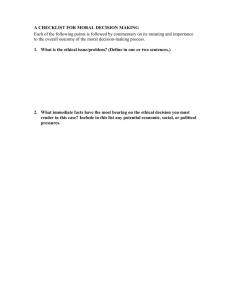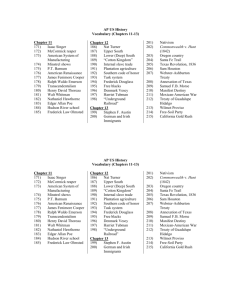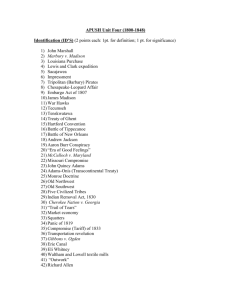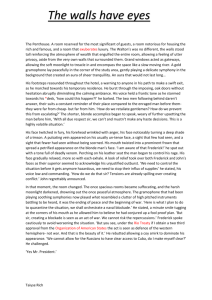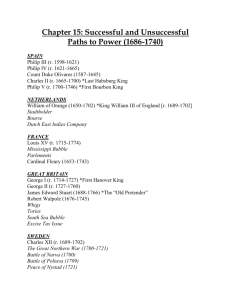PEOPLE'S DISCO - Eastern Caribbean Supreme Court
advertisement
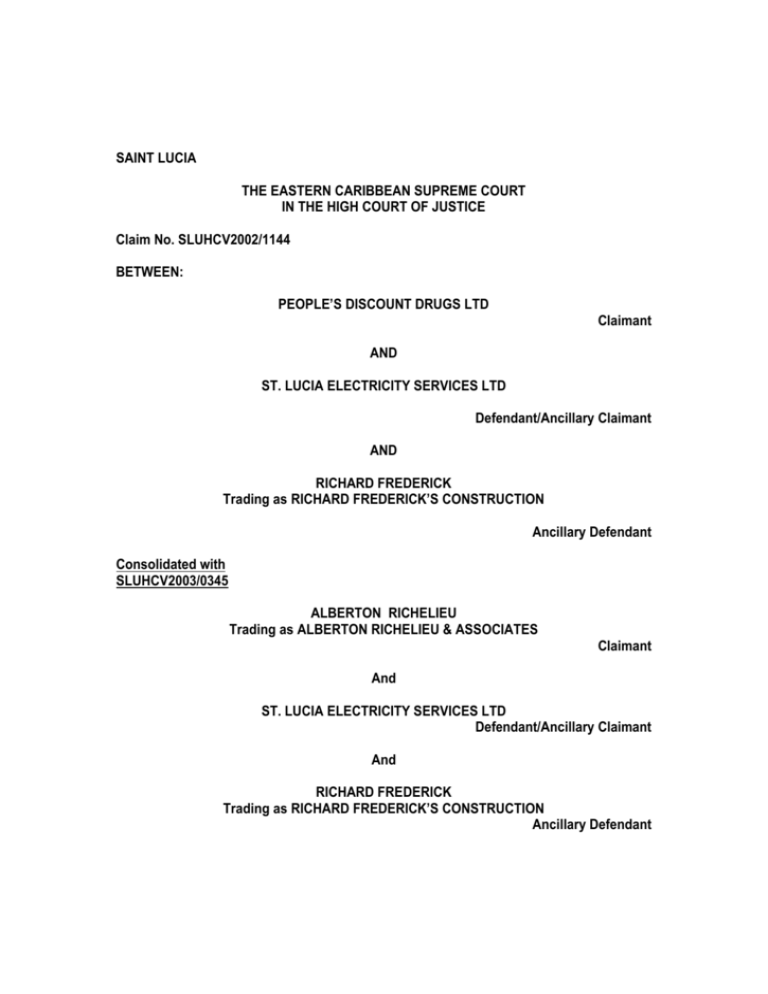
SAINT LUCIA THE EASTERN CARIBBEAN SUPREME COURT IN THE HIGH COURT OF JUSTICE Claim No. SLUHCV2002/1144 BETWEEN: PEOPLE’S DISCOUNT DRUGS LTD Claimant AND ST. LUCIA ELECTRICITY SERVICES LTD Defendant/Ancillary Claimant AND RICHARD FREDERICK Trading as RICHARD FREDERICK’S CONSTRUCTION Ancillary Defendant Consolidated with SLUHCV2003/0345 ALBERTON RICHELIEU Trading as ALBERTON RICHELIEU & ASSOCIATES Claimant And ST. LUCIA ELECTRICITY SERVICES LTD Defendant/Ancillary Claimant And RICHARD FREDERICK Trading as RICHARD FREDERICK’S CONSTRUCTION Ancillary Defendant Appearances: Leonard Ogilvy and Lorne Theophilus for Claimants Mark Maragh for LUCELEC Lydia Faisal for Richard Frederick …………………………… 2005: May 23, 24 June 3 …………………………… Introduction [1] The Claimants are a drugstore and a solicitor’s practice in Castries. At about 1.00 pm on 29 April 2002 there were explosions and sparks at their respective premises. The power supply was temporarily interrupted and damage was caused to electrical equipment. The Claimants started claims against LUCELEC (which were later consolidated) alleging that the incident had been caused by their negligence in allowing some nearby electric cables to come into contact with a building being constructed by Richard Frederick at the corner of Chisel and St Louis Streets. LUCELEC denied negligence and brought an ancillary claim against Mr Frederick for an indemnity or contribution, alleging that the incident had been caused by a piece of metal from Mr Frederick’s building site falling onto or otherwise coming into contact with the cables and causing a power surge. For some reason the Claimants have never sought to join Mr Frederick as a Defendant to the main claim. Procedural history [2] The case took a number of unexpected turns as a result of tactical decisions by the parties and I must relate some of the procedural history to make sense of it. [3] On 16 November 2004 Master Cottle gave directions fixing the trial date for 23 May 2005 and ordering that witness statements be filed and served by 28 February 2005. Mr Frederick filed a statement on 2 February 2005 in which he stated that he was present at the building site at 1.00 pm on 29 April 2002 and that there was a fight 2 between two of his workers which led to one of them throwing a u-shaped piece of metal at the other which got caught between two overhead electrical wires causing sparks. He argued in the witness statement that his workers were not acting in the course of their duties when they were fighting: if that was right he would not of course have been vicariously liable for their actions under Art 986 of the Civil Code. None of these facts had been set out in his Ancillary Defence and LUCELEC applied successfully in April 2005 to have the relevant paragraphs (17 to 25 inclusive) struck out of the witness statement. [4] LUCELEC for their part did not file or serve witness statements until 5 May 2005 although this should have been done by 28 February 2005. They applied at the same time for relief from sanctions under CPR 26.8. This was opposed by Mr Frederick who also applied for summary judgment. I adjourned both applications to the opening of the trial. Having heard the parties (including the Claimants who supported Mr Frederick’s position) I decided for reasons I gave orally that I could not grant LUCELEC relief from sanctions since they had not satisfied the requirements of CPR26.8(2). [5] In the light of that decision Mr Maragh for LUCELEC did not oppose Mr Frederick’s application for summary judgment and I accordingly dismissed the ancillary claim which meant that Mr Frederick dropped out of the case as a party. I should note that in dismissing the claim against Mr Frederick I awarded him costs limited to $2,000 (which I assessed as his costs of the two applications) on the basis that I was of the view that he had only had an arguable substantive defence to the ancillary claim and that he had been dismissed from the case only because of a fortuitous procedural default on the part of LUCELEC. [6] Although he had ceased to be a party the Claimants called Mr Frederick as their first witness. I could see no objection to this surprising turn of events since a witness statement had been served in respect of him as required by CPR 29.11(1) and there is, as the maxim has it, no property in a witness. When Mr Maragh for LUCELEC came to cross-examine Mr Frederick he proceeded, showing tactical skill in the face of some misguided discouragement from me, to ask him about the matters which his clients had had struck out of the witness statement and Mr Frederick gave the same account orally in cross-examination as he had given in paragraphs 17 to 25 of the witness statement. 3 The ironic position was thus reached that LUCELEC were now relying as against the Claimants on the very evidence which they had had struck out in the course of the ancillary claim, namely that the incident was caused by Mr Frederick’s workers in the course of their fight. The facts [7] In addition to Mr Frederick’s evidence I heard evidence on behalf of the Claimants from Mr and Mrs Richelieu on behalf of Mr Richelieu trading as Alberton Richelieu & Associates and from Jose Michel as a director and Morella Stanislaus as an employee of People’s Discount Drugs Ltd. It followed from my refusal of relief from sanctions that LUCELEC called no evidence. [8] Apart from Mr Frederick the only potential witness as to the cause of the incident was Mr Michel who stated at paragraph 4 of his statement that on the day in question he had seen a “low-lying electrical wire making contact with a multi-storey building that was under construction at the corner of St Louis and Chisel Streets”. When he came to give evidence Mr Michel told me that he did not recall saying this in his witness statement and was not able to support it now. That left only Mr Frederick’s account which I have no reason to doubt is accurate. I therefore find that the cause of the incident which appears to have led to the damage to the Claimants’ electrical equipment was that a u-shaped piece of metal was thrown in the direction of the LUCELEC overhead wires and hooked onto one of them causing a short circuit and power surge. I also accept Mr Frederick’s evidence that the following day LUCELEC replaced three un-insulated wires with one heavily insulated one. [9] Mr Michel gave evidence that the cost of replacing and repairing People’s Discount Drugs Ltd’s damaged electrical equipment was $7,176. Mr Richelieu’s evidence was that the cost of replacing and repairing the Alberton Richelieu & Associates equipment was $18,612. Mr Maragh suggested in his final speech that these claims were exaggerated but he did not cross-examine to that effect and I had no reason to doubt their truth: I accordingly accept this evidence. I should mention on the topic of damages that although there was some suggestion in the Statements of Claim that 4 damages for business interruption were also being sought Mr Ogilvy rightly abandoned any such claim. Are LUCELEC liable? [10] The relevant law in relation to delictual liability is contained in Art 985 of the Civil Code. It is well established and common ground that liability arises under that Article in the same circumstances as under the English law of negligence. It was not disputed that LUCELEC owed the Claimants a duty of care in supplying electricity (para 5 of Defence). The issues were whether LUCELEC had breached that duty in any way and whether any such breach caused the incident which led to the damage. [11] The particulars of negligence set out in the Statements of Claim allege that LUCELEC failed to keep their electrical wire a safe distance from the building under construction and that the damage arose from contact between the wire and the building. Even if there was proper evidence (and there was not) as to how the wires were configured in relation to the building and that this indicated negligence on the part of the electricity company it is clear on my findings of fact that the position of the wires cannot be said to have caused the incident. Any claim based on this allegation must therefore fail. [12] Mr Ogilvy argued instead that LUCELEC were negligent in not insulating their wires and that this was a substantial contributory cause of the incident. As a matter of first impression and common sense I would agree that it may be arguable that it is negligent of an electricity company to have un-insulated overhead cables carrying electricity in a crowded town like Castries and that, but for the cables being uninsulated, the incident and the damage to the Claimants’ property would not have happened. The problem with this case however is that the Claimants did not plead it anywhere in the Statements of Claim (and in particular did not plead that the wires were un-insulated) as required by CPR 8.7(1). [13] No doubt for good reason no attempt was made to introduce the new case by way of amendment but Mr Ogilvy argued that LUCELEC were well aware of all the facts relating to it because they were within their own knowledge at the outset and/or had been set out in Mr Frederick’s statement. I am satisfied that the Claimants also had 5 the means of knowing the facts at a fairly early stage but the state of either side’s knowledge is not relevant in my view (although it may have been relevant to an application to amend). The Claimants were under an obligation to set out their case in the statements of claim so that the court and the Defendant knew what that case was and the Defendant could decide what evidence and arguments they might wish to bring in answer. Their failure to do so means that they cannot advance this case at trial. [14] Mr Ogilvy also sought to answer the pleading point by relying on the plea of res ipsa loquitur which appears in the Statements of Claim as a particular of negligence. This is misconceived in my view. The mere fact that there was a power surge which caused damage to the Claimants’ equipment does not prove that it was caused by LUCELEC’s negligence. If the Claimants had wished to rely on the fact that the wires were uninsulated they would have had to plead that fact (and probably a certain amount more) before they could seek to prove negligence on that basis. [15] But, even assuming the case had been properly pleaded and I had found that LUCELEC were negligent and that but for this negligence the Claimants would not have suffered any damage, nevertheless Mr Maragh had a further answer to the claim which in my view would have succeeded. He says that the sole legal cause of the accident was the wrongful action of Mr Frederick’s worker in throwing a piece of metal towards the cables and not any negligence on the part of LUCELEC. [16] He referred me in this connection to a decision of the English Court of Appeal, Lamb v Camden LBC [1981] QB 625. The case is difficult because the three Lords Justices of Appeal (who included Lord Denning MR) gave different reasons for their decision but I think the law on this topic is accurately stated as follows: where an accident is caused by the actions of an independent human agency over which the alleged tortfeasor has no control the law will regard the accident as being caused solely by the independent human agency and not by the alleged tortfeasor unless the actions of the independent human agency were, viewed objectively, very likely to occur (or more than just foreseeable). [17] Applying this test to the case in question, I think the Claimants would have failed on causation and remoteness. The circumstances of the accident, although foreseeable, 6 were most unusual and unlikely in my view: the piece of metal happened to be ushaped and happened to lodge itself in such a way as to cause a power surge. I think this can only be described as a complete “fluke”. Conclusion and result [18} I therefore reject the case on failure to insulate (a) because it was not pleaded and (b) because it was bound to fail on causation, and I consequently dismiss the claims made by both Claimants. Subject to any submissions to the contrary I shall also order the Claimants to pay LUCELEC’s costs on the prescribed basis: People’s Discount Drugs Ltd shall accordingly pay costs of $2,152 (based on their claim of $7,176) and Mr Richelieu costs of $10,815 (based on his claim for $37,260). Murray Shanks HIGH COURT JUDGE (Ag) 7




